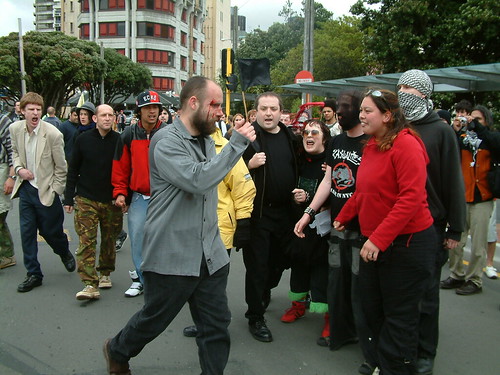“The latest annual greenhouse gas inventory report shows New Zealand’s emissions rose less than one per cent between 2005 and 2006... the increase of less a percent is an improvement on the previous year’s increase of 3 percent.” - David Parker, Minister for Responsible for Climate Change Issues
If Parker is breaking out the champagne, he'd better have the world's smallest bottle. The best news he can take out of the latest report on New Zealand's greenhouse gas emissions is that our position is getting worse – though getting worse at a slower rate. But even that change is still insignificantly small.
Under Kyoto, New Zealand is obligated to bring its average net emissions between 2008-2012 down to 1990 levels, or to pay for the difference. The latest report showed that in 2006, New Zealand generated 26% more carbon dioxide equivalent emissions than it did in 1990.
As late as 2005, it was thought that New Zealand would be able to meet its Kyoto targets and then some, but now that seems highly unlikely. The last set of projections expected the current trend to continue, and that by 2012, New Zealand would have blown its Kyoto target by 45.5 million tonnes of emissions.
At the current price for carbon credits, that bill would come to a total of $943 million. That bill has risen rapidly over the last few years, mostly due to the international price of carbon credits more than doubling in the since 2006.
Another big chunk of that is, believe it or not, the price of milk. The last set of projections took into account the increase in dairy prices, which is expected to increase the number of dairy cows in New Zealand. The extra cows are expected to generate an additional 4.3 million tonnes of emissions between now and 2012. And that's just the flatulence. Processing the milk from these cows will require additional power, pumping another 1.5 million tonnes of greenhouse gases into the atmosphere.
Altogether, the additional emissions will cost New Zealand about $120 million at the current price for carbon credits.
But the price effect works the other way as well. In the 2006 projections, the increase of the price of oil from US$30 to US$60 per barrel was expected to make more people use public transport, or simply travel less. The effect is to reduce oil usage and reduce emissions by a whooping 14.5 million tonnes over between 2008-12 (that's worth $300 million). The price of oil has nearly doubled again since then, and current is currently at US$118 per barrel.
"New Zealand's greenhouse gas emissions are growing faster than almost any developed country.” - Nick Smith, National Climate Change Spokesman
That's an exaggeration, but sadly, a fairly small one. The 2006 international figures haven't been compiled yet, but according to the 2005 figures, the growth in New Zealand's net emission since 1990 is the 6th highest among the 23 developed countries that are signed up to Kyoto. If we just looked at growth in the last 5 years, New Zealand still ranks 7th out of 23. Our emissions have grown even faster than the United States, which has not ratified the Kyoto Protocol.
So does Helen Clark deserve her latest gong as “Champion of the Earth”? New Zealand is so far behind on its climate change targets that any debate about whether we should be a world leader or fast follower just plain ridiculous, but it's worth noting that the talk about New Zealand's obligation under the Kyoto Protocol is usually only referring to the first “Commitment Period”, or 2008-2012. In the grand scheme of things, it's not a very long time, and more recent climate change policies may prove their worth over the longer term. That isn't going to stop us from having to fork out a billion dollars in 2012, but at least we can take comfort in the knowledge that the money is providing other countries with the incentives to do what we've failed to do.
